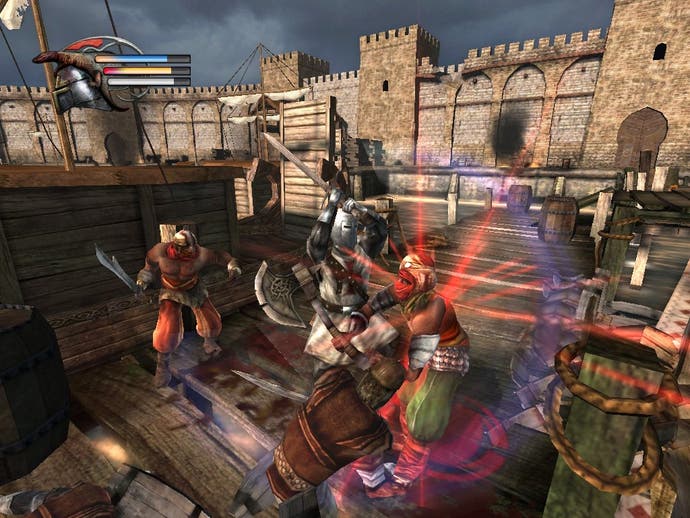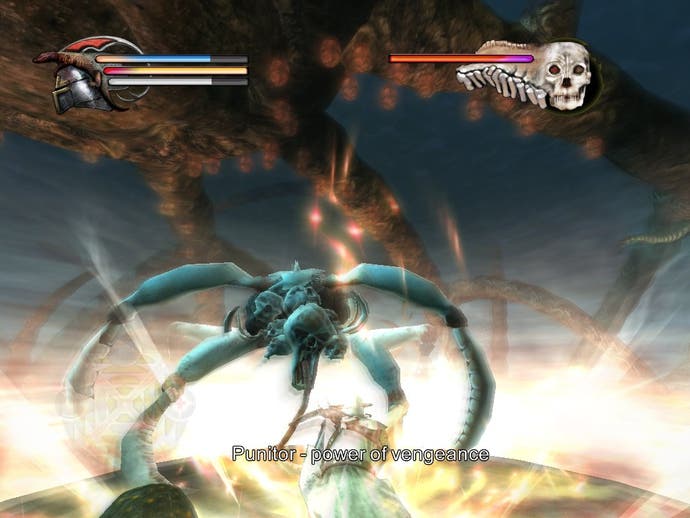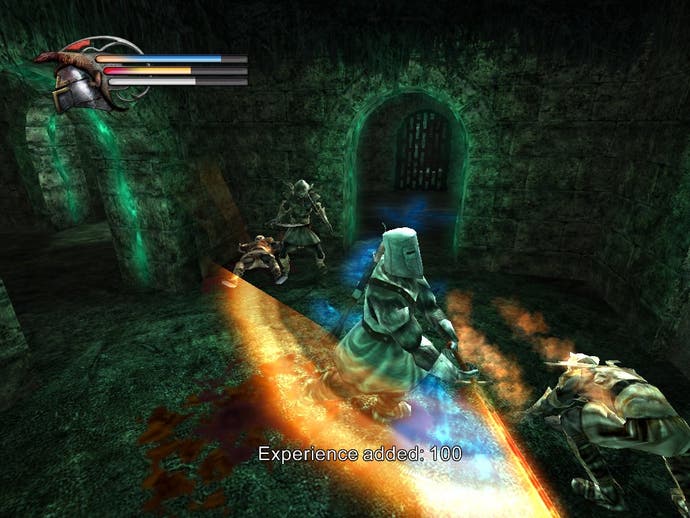Knights of the Temple 2
De Raque on the rack.
Ask me about Knights of the Temple 2 in a year's time and I may well respond with a blank 'Never-heard-of-it' stare. This is one of those titles that fills a cold wet winter weekend pleasantly enough but then fades from the memory faster than a Murder She Wrote plot or a Daniel O'Donnell ditty.
OK, to be fair, a year from now I probably will remember a few things about KOTT2. I'll doubtless recall that it was a third-person hack-and-slash button-masher with a chronically-uninspired plot that had something to do with a medieval knight, a hell gate and some unwelcome demons. If I think really hard I may be able to recollect dashing around an attractive quayside slicing manically at charging Saracens; I might remember a scene in a tavern where I got to participate in a drunken William Tell routine - shoot the apple off the wench's head while under the influence of the local brew and win the treasure map (or something along those lines). Beyond these fuzzy memories and a mental knotted handkerchief reminding me not to get too excited about KOTT3 nothing will remain of my KOTT2 experience except the following observations...
Short on character

There's a school of thought that says character class choices at the start of an RPG aren't all that helpful (Why ask a player to close career doors before they've even had a chance to sample the gameplay?) Personally, being a frugal fellow, I'm always happy to know that once I've completed a fantasy crawl as a nimble rogue or a muscle-bound barbarian I can always replay it as a spell-weaving wizard or a hairy halfling. You don't get that choice here; it's Paul De Raque, the personality bereft Knight Templar from the first game, or nothing. This limitation isn't quite as restrictive as it first appears as Paul can cast the odd spell and be moulded during play, but still it would have been nice to have had a choice of avatars.
The bucket-helmeted hero that starts KOTT2 is quite different from the bucket-helmeted hero that finishes it thanks largely to six upgradeable core abilities and, potentially, around twenty different combat moves. There's no levelling-up but the spilt blood of foes does translate into experience points that can be spent on new skills and upgrades. Cautious crusader? Invest early XPs bolstering your constitution or enhancing your Curatio (heal spell) and Sanctus (temporary magical armour) abilities. Blood-crazed brutalizer? Turn your haul into punchier Punitor attacks (a shockwave-producing stomp) or fancy kill combos like the Prosecutor and the Angel's Wings. Masterfully motion-captured and decorated with plenty of glittering light effects, the various twirls, stabs and swipes are visually very satisfying. How useful they are is more questionable. Usually the old tactic of blindly pummelling your gamepad/mouse until it pleads for mercy seems to get the job done.
Tongue lashing

In addition to skewering and slashing enemies with various edged weapons (disappointingly there's no decapitation or amputation modelled) and boshing them with assorted hammers and maces you can also poke holes in them from afar with a handy crossbow. Fired from a close-in over-the-shoulder-view, it's an effective tool but also a slightly unsporting one considering the basic level of AI exhibited by most opponents. Happy to stand around idly while nearby comrades slump to the deck, and polite enough, usually, to attack in uncoordinated ones and twos rather than dangerous gangs, the primarily bipedal opposition rarely display any behaviours that suggest intelligence or imagination. The half-dozen or so bosses you encounter on your travels are a bit cannier and a bit more memorable. Chopping the claws off the big crab thing in the green cave, yes that was fun, as was dodging the long probing tongue of that fluid-leaking skeletal behemoth on the Isle of the Dead.
Unlike its predecessor, KOTT2 doesn't drive you down a single, narrow sheep track. There are three main locations - all striking coastal cities - and three artefacts to be recovered. The order you visit these places and acquire these items is totally up to you. Play on the lowest difficulty level and stick resolutely to the central tasks and the game wont last much longer than a weekend. Ramp-up the challenge, take-on a few of the side quests offered by NPCs and there's weeks of entertainment - albeit formulaic entertainment - on offer here. That William Tell wager mentioned earlier is one of the more inventive optional quests. Most fall into the 'Bring me a quantity of X' or 'Kill the Y in my cellar'-type affairs. Like most aspects of the game, including the bland dialogue and hackneyed plot they feel like they've been inspired by elements of other games rather than that ridiculously rich experience commonly referred to as 'Life'. A pity that. With a little more freshness and originality, perhaps even the odd dash of humour, KOTT2 might have had more personality.
Leap of faith

Anyone that thinks stealth sections, platforming, and puzzles should be kept-out of action-orientated RPGs will find little to grumble about here. Despite a chamber in the tutorial complex that teaches you how to hug shadows and avoid noisy floor surfaces, there's almost no opportunity to creep or hide. Similarly, though you can leap amazingly well for a bloke draped head to toe in steel plate and chain-mail, gymnastic challenges are limited to some very simple plank-negotiating, monkey-walking, and mantling. I was preparing a venomous rant about the absurd difficulty of one of the few puzzles in the game, until I noticed that the required code was on a sheet of parchment a few steps from the puzzle itself. That pretty much says all you need to know about how clever, or sober, you have to be to get ahead in KOTT2.
Predictably there are times when you find yourself staring at the back of a pillar or a low arch as Paul gets the sherbet kicked out of him. Very few third-person titles have flawless cameras so it would be wrong to dock many marks for that. Where KOTT2 does shed points and shed lots of them is its lack of distinctiveness and character. There really isn't one fresh idea or genuine surprise here. That's unforgivable.
